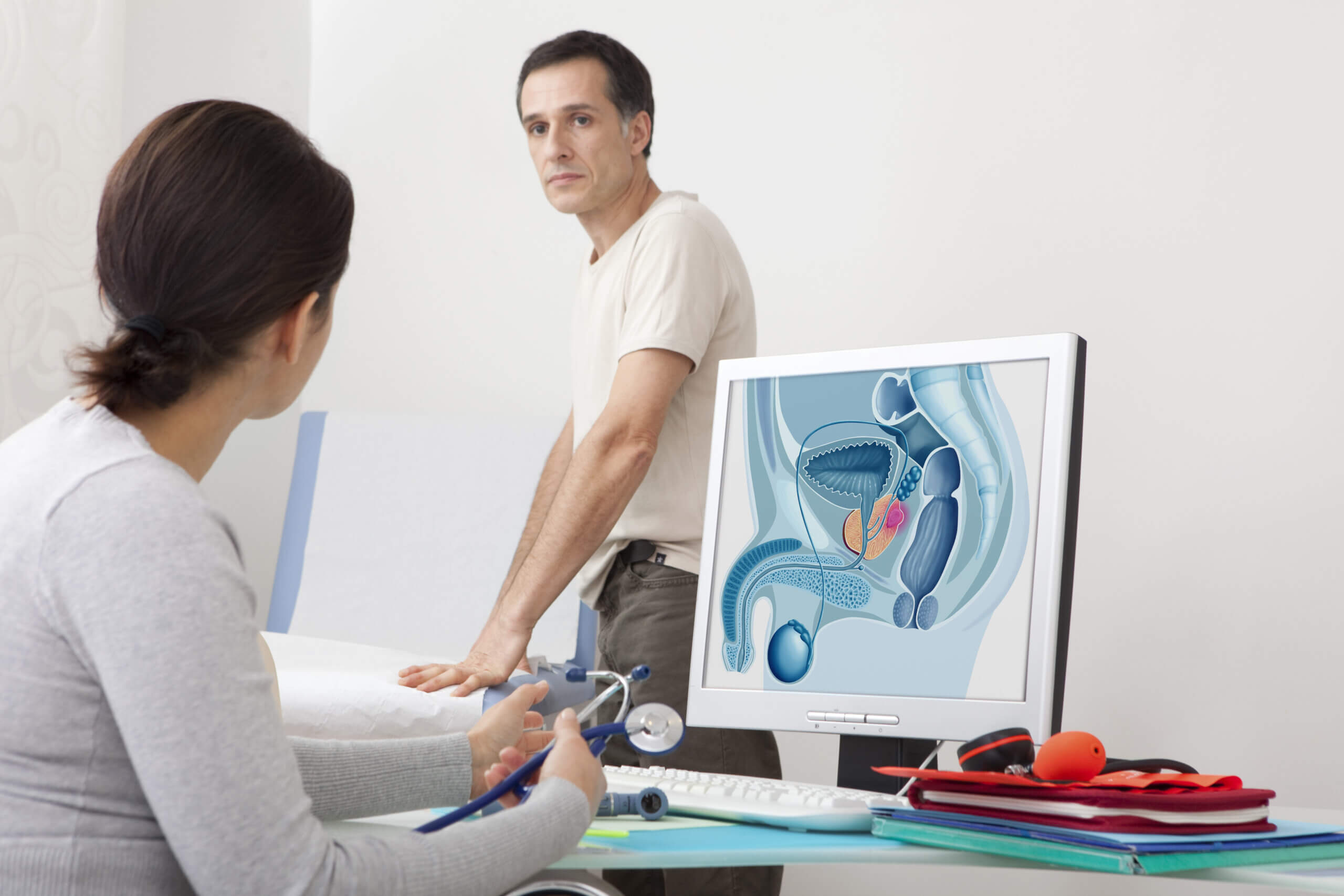
Page contents
- What is prostate cancer?
- How common is prostate cancer?
- What causes prostate cancer?
- How can I reduce the risk of prostate cancer?
- What are the warning signs of prostate cancer?
- What are prostate cancer symptoms?
- How serious is an enlarged prostate?
- Enlarged Prostate Treatment
- What should I do if I think I have prostate cancer?
- How is prostate cancer diagnosed?
- What happens if I have prostate cancer?
- How can prostate cancer spread?
- How do you treat prostate cancer?
- Is prostate cancer curable?
- What is the prostate cancer life expectancy?
- Prostate Cancer Survival Rates (all ages)
- What should I do if my cancer is terminal?
- What support is available if I have prostate cancer?
Page contents
- What is prostate cancer?
- How common is prostate cancer?
- What causes prostate cancer?
- How can I reduce the risk of prostate cancer?
- What are the warning signs of prostate cancer?
- What are prostate cancer symptoms?
- How serious is an enlarged prostate?
- Enlarged Prostate Treatment
- What should I do if I think I have prostate cancer?
- How is prostate cancer diagnosed?
- What happens if I have prostate cancer?
- How can prostate cancer spread?
- How do you treat prostate cancer?
- Is prostate cancer curable?
- What is the prostate cancer life expectancy?
- Prostate Cancer Survival Rates (all ages)
- What should I do if my cancer is terminal?
- What support is available if I have prostate cancer?
If you are a man aged 50+, you may be at greater risk of developing prostate cancer and experiencing prostate cancer symptoms. When it comes to prostate cancer life expectancy, you can live a long time if this cancer is detected in the early stages. This article highlights prostate cancer and non-cancerous enlarged prostate issues.
Why are people walking 11,000 steps in March for charity? The March the Month campaign recognises the 11,000 men who die every year of prostate cancer. Prostate Cancer UK is raising money to fund research and support for men and families affected by it.
Mark was diagnosed with the disease in 2022. He walked daily for March the Month while wearing blue boxers over his trousers to raise awareness and money.
“I want to encourage my male friends and relatives and all the other men out there to speak to their GP about the disease, if they have any worries or concerns about it,” he told Prostate Cancer UK.
What is prostate cancer?
Half of everyone in the UK will get cancer in their lifetime. There are more than 200 different types of cancer. Cancer occurs when abnormal cells in the body divide and grow. They can grow into surrounding tissues, organs and to other parts of the body.
The prostate is a small gland in the pelvis. The prostate is part of the male reproductive system. It is located below the bladder between the penis and rectum. It surrounds the urethra (the tube which empties urine from the bladder).
How common is prostate cancer?
One in eight men in the UK will be diagnosed with prostate cancer, according to Prostate Cancer UK.
What causes prostate cancer?
It is not known what causes prostate cancer.
You may be more likely to develop prostate cancer if:
- You are a man and are aged 50+.
- Your father or brother had prostate cancer. (Increases risk by two and a half times according to Prostate Cancer UK).
- You have a BRCA2 or BRCA1 gene variant.
- You are obese.
- You are black. (A quarter of black men in the UK will get prostate cancer according to Prostate Cancer UK).
How can I reduce the risk of prostate cancer?
You should try to lead a healthy lifestyle. There is some research to suggest being obese places a man at higher risk of this cancer. It is a good idea to maintain a healthy weight with a healthy diet and regular exercise.
What are the warning signs of prostate cancer?
Prostate cancer develops gradually. A man may not get any prostate cancer symptoms for years.
What are prostate cancer symptoms?
When the prostate is large enough to affect the urethra (the tube carrying urine from the bladder out of the penis) it can put pressure on it.
When this happens, these symptoms can emerge:
- A greater urge to urinate, day and night.
- Straining while urinating.
- Feeling your bladder has not fully emptied.
If you have these symptoms, it is not always prostate cancer. You may instead have a non-cancerous enlarged prostate.
How serious is an enlarged prostate?

Enlarged Prostate Treatment
A Benign Prostate Enlargement (BPE) is not a serious threat to health. Prostate enlargement is common in men aged 50+. An enlarged prostate is believed to be caused by hormonal changes as men age.
King Charles received treatment in hospital for an enlarged prostate on 26 January 2024.
While in hospital, the monarch was diagnosed with cancer. At the time, Buckingham, Palace confirmed the monarch did not have prostate cancer but another form of cancer.
Treatment for a benign prostate enlargement will depend on how serious the symptoms are.
If you have mild symptoms, you may be advised to:
- Drink less alcohol, caffeine and fizzy drinks.
- Drink less in the evening.
- Restrict consumption of artificial sweeteners.
- Exercise more.
If you have moderate to severe symptoms you may have:
- Medicine to reduce the size of the prostate and relax your bladder.
- Surgery is recommended if your moderate to severe symptoms are not remedied by medicine.
Benign Prostate Enlargement complications
Complications linked to a BPE include:
- A urinary tract infection (UTI)
- Chronic urinary retention. This can stretch your bladder muscle and make it weaker.
- Acute urinary retention (AUR). Suddenly unable to pass any urine which requires emergency hospital treatment.
According to the NHS, the risk of developing prostate cancer is no greater for men with an enlarged prostate than it is for men without it.
What should I do if I think I have prostate cancer?
You should be aware of what prostate cancer symptoms are and see your GP to get any symptoms checked.
How is prostate cancer diagnosed?
Your GP is likely to:
- Ask you if there is a family history of prostate cancer.
- Ask for a urine sample to check for infection.
- Physically examine your prostate by inserting a gloved finger into your bottom. This is a Digital Rectal Examination (DRE).
- Take a blood test to check your level of Prostate-Specific Antigen (PSA). If aged 50+ you can ask your GP for a PSA test to measure the amount of PSA in your blood. It is measured in nanograms of PSA per millilitre of blood (ng/ml). According to the NHS, if you are aged 50-69, a raised PSA is 3ng/ml or higher. If this test reveals high PSA levels this could be prostate cancer or you have a (non-cancerous) enlarged prostate.
- MRI scan. If you have a raised PSA level, your GP may refer you to hospital for an MRI scan. If the scan reveals an issue, you may be referred for a biopsy.
- Biopsy. A biopsy involves taking small amounts from your prostate to examine for cancerous cells.
What happens if I have prostate cancer?
If you have prostate cancer, you may need more tests to identify if the cancer has spread and what treatment is the most suitable for you.
How can prostate cancer spread?
If there’s a major chance the cancer has spread from your prostate to other parts of the body, the following tests may be conducted:
- MRI scan (Magnetic resonance imaging) uses magnetic fields and radio waves to produce images of the inside of the body.
- CT scan (Computerised Tomography). This takes pictures of the inside of the body to diagnose conditions or check how well treatment is working.
- PET scan (Positron emission tomography) is used to detect cancer in different parts of your body.
- Isotope bone scan. This can detect whether the cancer has spread to your bones.
How do you treat prostate cancer?
To decide what treatment you should have, your doctors will consider the factors highlighted below:
- Type and size of the cancer.
- The grade of cancer. (Grade means how abnormal the cells look under the microscope).
- The stage of the cancer when it was diagnosed (how far it has spread).
- Your general health and fitness.
Treatment has a risk of side effects, including erectile dysfunction (impotence), incontinence and having to go to the toilet more often. A wait and see approach may be recommended for older men when it’s unlikely the cancer will affect their natural lifespan.
Treatments include:
- Surgery may be done to remove your prostate gland. This is called a radical prostatectomy. After this surgery, you will not be able to ejaculate during sex. This means you will not be able to have children through sexual intercourse.
- Radiotherapy uses radiation to kill cancer cells. A machine is used to target beams of radiation directly at tumours.
- Hormone Therapy. The testosterone hormone controls the growth of cells in the prostate. Hormone therapy to limit testosterone’s impact can be given before or after radiotherapy. This can make the radiotherapy more effective. Hormone therapy tries to stop the cancer returning and is also used to slow the progress of advanced prostate cancer and alleviate symptoms.
- High-intensity focused ultrasound (HIFU) can be used to treat prostate cancer that has not spread beyond the prostate. An ultrasound probe, inserted into the rectum, releases high-frequency sound waves through the rectum wall to try to kill cancer cells in the prostate gland by heating them up to a high temperature.
- Cryotherapy kills cancer cells by freezing them. Needles are inserted into the prostate gland through the rectum wall to freeze the gland.
- Chemotherapy destroys cancer cells and is used to treat cancer that has spread to other parts of the body. It is not a cure for prostate cancer but itis used to slow the progress of advanced prostate cancer to relieve symptoms and help people live longer.
- Medicine. Steroid tablets e.g. dexamethasone, can shrink a tumour. Steroids are used when hormone therapy does not work.
Is prostate cancer curable?
Yes, prostate cancer is curable, especially if detected in the early stages. Some cases are only diagnosed at a later stage when the cancer has spread. If the prostate cancer has reached an advanced stage and has spread to other parts of the body it cannot be cured.
What is the prostate cancer life expectancy?
According to Cancer Research UK, a person’s prostate cancer life expectancy depends on: The type and size of the cancer, the grade (how abnormal the cells look under the microscope), the stage of the cancer when it was diagnosed (how far it has spread) and a person’s general health and fitness.
When it comes to life expectancy, you can live a long time with prostate cancer.
Out of 40,095 men aged 55-64 (diagnosed with prostate cancer between 2013-2017) 99% survived after 1 year and 93% survived after 5 years.
Of the men aged 65-74 (83,311 diagnosed with prostate cancer between 2013-2017) 98% survived after 1 year. Some 92% were alive after 5 years.
Of the men aged 75-84 (55,378), some 95% survived a year later and 81% after 5 years.
Men aged 85-99 (16,557), some 79% survived after 1 year. Only 46% lived after 5 years.
Prostate Cancer Survival Rates (all ages)
Men of all ages diagnosed with stage 1, 2 or 3 prostate cancer had a 100% chance of surviving 1 year after their diagnosis.
If you are a man diagnosed with stage 4 prostate cancer, you have a 88% chance of being alive a year later.
Men diagnosed with stage 1 or 2 had a 100% chance of surviving 5 years later. Those in stage 3 had a 95% chance. However, people in stage 4 had only a 49% chance.
What should I do if my cancer is terminal?
Sir Chris Hoy, the seven-time Olympic medallist in track cycling has said he has two to four years left to live after announcing he has been diagnosed with terminal prostate cancer. The former British cyclist found out he had a tumour in his shoulder in September 2023. He announced his cancer diagnosis in February 2024.
If the prostate cancer has reached an advanced stage and it spreads to other parts of the body, it cannot be cured. Treatment is focused on prolonging life and relieving symptoms.
Palliative care is available if you are terminally ill.
If your cancer is terminal, it is important to:
- Get support. Marie Curie offers care and support for people affected by terminal illness via its website www.mariecurie.org.uk and helpline: 0800 090 2309.
- Tell your family and friends. Let family and close friends know what to expect and what your wishes are for your funeral etc.
- Get your affairs in order. Write a will and talk to your family/loved ones about it.
- Spend time with the people you love. Consider doing the things you want to do e.g. try to fulfil a bucket list.
What support is available if I have prostate cancer?
Home care
Domiciliary care (also known as home care) involves care staff visiting people in their own home to provide support and/or care. Home care is arranged via your local authority or via private home care agencies. You can read this advice article to find out about Types of homecare and visits.
Types of home care include:
- Personal care (assistance with showering. getting in and out of bed, help going to the toilet). Help with daily tasks.
- Rehabilitation after a stay in hospital.
- Nursing care.
- Palliative care.
Prostate cancer helplines and support groups
- Prostate Cancer UK nurses are available to talk Monday to Friday on 0800 074 8383. You can use live chat, email or Whats App. You can also text NURSE to 70004 to request a call back from a Specialist Nurse.
- Macmillan Cancer Support has a free helpline. Call 0808 808 00 00.
- Cancer Research UK has a Cancer Research Online cancer chat forum
- on its website and a Cancer Research Nurse helpline: 0808 800 4040.
Diagnosed with advanced prostate cancer, Mark has walked 11,000 steps to raise funds for the March the Month campaign. Mark told the charity: “I don’t want anyone to receive a diagnosis, when it is too late, like I did.


